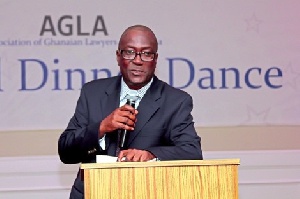Professor Henry Kwasi Prempeh, a Professor at Law, has suggested that whistleblowers should be provided with incentives to encourage them to provide information on corruption cases when the Office of Special Persecutor becomes operational.
He said the provision of incentives was a practice that had helped in the fight against corruption in many jurisdictions such as the United States of America (USA).
Prof. Prempeh, who is a professor at the Seton Hall University in the USA, made the suggestion on behalf of civil society on the first of a two-day special stakeholders’ conference on the Office of the Special Prosecutor’s Bill, underway at the Parliament House in Accra.
The legal expert spoke on behalf of institutions like the Ghana Integrity Initiative (GII) and the Ghana Centre for Democratic Development (CDD-Ghana).
The stakeholders’ conference was organised by the Committee on Constitutional, Legal and Parliamentary Affairs of Parliament, which is considering the substance and heart of the Bill before its consideration and passage.
Opinions were varied on whether whistleblowers on corruption cases should be rewarded to ensure a successful prosecution and conviction of offenders.
Prof. Prempeh, who led the argument for the civil society groups, said in the US people were paid if information was provided on corruption.
“To that extent, they are making a living from that,” he said, but cautioned that there could be provisions to punish people who would provide wrong information.
That, he said, would open the flood gate for people to provide unauthentic information.
Prof. Prempeh said if authentic information was given by a volunteer, the case must travel to its final determination and the person must be convicted before the reward was given to the whistleblower.
“If the information is given and the case is not successfully prosecuted, the whistleblower should not be given any reward,” Prof. Prempeh said.
However, Mr Magnus Kofi Amoatey, the Member of Parliament for Yilo Krobo, from the Minority National Democratic Congress (NDC) side, said the suggestion to reward the whistleblower must be subjected to critical scrutiny, in the face of many electronic broadcasting stations where people phone in to provide information, some of which are volatile.
The conference highlighted the need to protect the privacy of such whistleblowers to encourage people to volunteer information in the fight against corruption.
The independence of the Special Prosecutor also generated intense debate at the conference, with some fearing the true independence of the Special Prosecutor who could not pander to the whims and caprices of the Executive.
Prof. Kwasi Afrifa, a Political Scientist and a Lawyer, said it was important to focus more attention on the constitutionality of the Office of the Special Prosecutor in relation to the creation of the Attorney-General’s Office under Article 88 of the 1992 Constitution, which would cede some its authority to the Special Prosecutor rather than focusing on the independence of the Office.
He said that the security of tenure of office for the prosecutor and remuneration should guarantee some sort of independence while criticisms and public court could also ensure that the Special Prosecutor would not be engaging in any witch-hunting.
Mr Ben Abdallah Banda, the Chairman of the Legal and Constitutional Affairs Committee and MP for Offinso South, said the Special Prosecutor must have solid integrity to ensure that he did his job professionally.
Dr Dominic Ayine (ND), MP for Bolgatanga East, said the Minority had come to appreciate the importance of the Office of the Special Prosecutor that would help in the fight against corruption in the country.
General News of Thursday, 14 September 2017
Source: ghananewsagency.org













